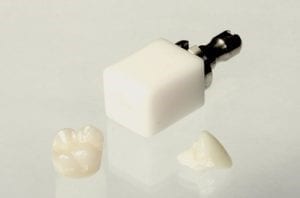I went to see a cosmetic dentist because my regular dentist told me that he doesn’t do CEREC crowns. When I had heard that the cavity I had was too big to for a regular filling, I started researching them. It sounded like CEREC crowns would be done in one appointment. And I found all kinds of horror stories about temporary crowns, so I was set on CEREC.
This cosmetic dentist was new to me and all seemed to go fine at the appointment. I was shocked when my crown broke in half only two weeks after the appointment. I was eating dinner and I felt it crunch. When I called the dentist, he told me he would fix it for free. But, now I’m skeptical because I cannot believe the crown broke. Is he just going to glue it back together? Or will he actually make me a new one. Either way, I’m skeptical and nervous.
Have you ever heard of this happening with CEREC crowns or any types of crowns? If it is rare, I’m willing to try again. However, if it is unheard of, I’d rather go to a new dentist and have it done correctly.
-John in Nevada
John,
Your broken crown is a rare occurrence. Something must have been wrong from the beginning. Did you notice any issues with your bite? For example, did it hurt to chew or did you experience any jaw or tooth pain? Is it possible that the crown was the first tooth that touched when you closed your bite? Those are typically indicators that the crown is not fitted properly. However, they can usually be checked and adjusted. It is concerning that it broke and so soon after having it placed.

The other issue that may be a factor is grinding or clenching? Have you ever known yourself to clench at night? In some cases, if the bite isn’t perfect, your body will sense it. This sometimes results in biting or clenching while you sleep. Do you ever wake up with a sore jaw, headaches or toothaches? These are symptoms of TMJ disorder. The fix is usually a nightguard that is manufactured that fits snugly over your teeth. The grinding forces that take place during sleep are exponentially stronger than normal biting. So, a nightguard would be good to protect the cosmetic dentistry restoration and your other teeth too.
Chat with the dentist that did the work and see if he has ever seen anything like it. It is encouraging that he is trying to make it right. And it may be worth it to discuss the possibility of night grinding with him too. Please let us know how it goes!
This post is sponsored by Barrington cosmetic dentist James T. Gavrilos
